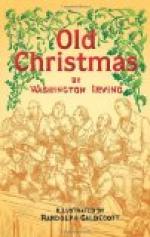My companion looked round him with transport:—“How often,” said he, “have I scampered up this avenue, on returning home on school vacations! How often have I played under these trees when a boy! I feel a degree of filial reverence for them, as we look up to those who have cherished us in childhood. My father was always scrupulous in exacting our holidays, and having us around him on family festivals. He used to direct and superintend our games with the strictness that some parents do the studies of their children. He was very particular that we should play the old English games according to their original form and consulted old books for precedent and authority for every ‘merrie disport;’ yet I assure you there never was pedantry so delightful. It was the policy of the good old gentleman to make his children feel that home was the happiest place in the world; and I value this delicious home-feeling as one of the choicest gifts a parent can bestow.”
We were interrupted by the clangour of a troop of dogs of all sorts and sizes, “mongrel, puppy, whelp, and hound, and curs of low degree,” that, disturbed by the ringing of the porter’s bell, and the rattling of the chaise, came bounding, open-mouthed, across the lawn.
“The little
dogs and all,
Tray, Blanch, and Sweetheart—see,
they bark at me!”
cried Bracebridge, laughing. At the sound of his voice the bark was changed into a yelp of delight, and in a moment he was surrounded and almost overpowered by the caresses of the faithful animals.
We had now come in full view of the old family mansion, partly thrown in deep shadow, and partly lit up by the cold moonshine. It was an irregular building of some magnitude, and seemed to be of the architecture of different periods. One wing was, evidently very ancient, with heavy stone-shafted bow windows jutting out and overrun with ivy, from among the foliage of which the small diamond-shaped panes of glass glittered with the moonbeams. The rest of the house was in the French taste of Charles the Second’s time, having been repaired and altered, as my friend told me, by one of his ancestors, who returned with that monarch at the Restoration. The grounds about the house were laid out in the old formal manner of artificial flower-beds, clipped shrubberies, raised terraces, and heavy stone balustrades, ornamented with urns, a leaden statue or two, and a jet of water. The old gentleman, I was told, was extremely careful to preserve this obsolete finery in all its original state. He admired this fashion in gardening; it had an air of magnificence, was courtly and noble, and befitting good old family style. The boasted imitation of nature in modern gardening had sprung up with modern republican notions, but did not suit a monarchical government; it smacked of the levelling system. I could not help smiling at this introduction of politics into gardening, though I expressed some apprehension that I should find the old gentleman rather intolerant in his creed. Frank assured me, however, that it was almost the only instance in which he had ever heard his father meddle with politics; and he believed that he had got this notion from a member of Parliament who once passed a few weeks with him. The Squire was glad of any argument to defend his clipped yew-trees and formal terraces, which had been occasionally attacked by modern landscape gardeners.




